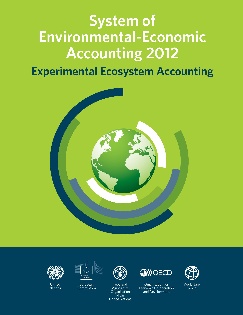- Created by Piyapat Nakornchai, last modified on Jan 12, 2021
 The SEEA, an international statistical standard, provides a coherent and integrated framework for collecting, organizing, analysing, presenting environmental data and relating it to economic and social data. It adheres to the principles of the System of National Accounts (SNA), and expands its scope by:
The SEEA, an international statistical standard, provides a coherent and integrated framework for collecting, organizing, analysing, presenting environmental data and relating it to economic and social data. It adheres to the principles of the System of National Accounts (SNA), and expands its scope by:
- taking an accounting approach to record the stocks and flows of natural inputs into the economy,
- providing standard terminology, definitions, methods and classifications,
- adding measures and classifications of:
- physical stocks of natural capital (including ecosystems) and their monetary values,
- physical resource flows (land, metals and minerals, timber, energy, water, fish) into the economy
- residual flows from the economy (air emissions, water effluents, solid waste) into the environment
- environmental activities such as protection expenditures, taxes and subsidies,
- ecosystems and their services, including biodiversity and carbon sequestration, and
- linking economic activities (producers and consumers) to societal benefits.
Together, FDES and SEEA can address many of the requirements for monitoring and reporting on progress towards national and international environmental, sustainable development, biodiversity and green economy priorities. These requirements include addressing the demand for information in support of integrated policies of the 2030 Agenda for Sustainable Development.
Most FEDS and SEEA indicators and accounts have been implemented in many national contexts. Since national institutional arrangements, environmental contexts and priorities and capacities differ, the guidance on implementation is flexible and modular. This allows countries to select priority information and adapt the guidance to their individual requirements.
System of Environmental Economic Accounting Experimental Ecosystem Accounting (SEEA-EEA)
| Chapter 2 Principles of Ecosystem Accounting | Presentations | Exercises |
|---|---|---|
| 2.1 Key Concepts and Overview | ||
| 2.3 and 2.5 Spatial Units, Scaling and Aggregation | ||
Chapter 3 Accounting for Ecosystem Services in Physical Terms and Chapter 5 Approaches to Valuation for Ecosystem Services and Ecosystem Assets | Presentations | Exercises |
| Ecosystem Services Supply | ||
| Ecosystem Services Use | ||
| Chapter 4 Accounting for Ecosystem Assets in Physical Terms | Presentations | Exercises |
| 4.3a Ecosystem Extent | ||
| 4.3b Ecosystem Condition | ||
| 4.3c Water | ||
| 4.4 Accounting for Carbon | ||
| 4.5 Accounting for Biodiversity | ||
| Additional Tools | Presentations | Exercises |
| Biophysical Modelling | ||
| Classifications | ||
| Diagnostic Tool |
Pages
A note to the user:
The materials are in progress and are subject to change. They are necessarily simplifications of the materials in the guidance documents, which should be the main reference for producing statistics and accounts.
Disclaimer:
These materials are free for you to use, adapt and translate. If you do adapt them, please acknowledge ESCAP. They were produced in collaboration with many partners, who are acknowledged in the documents. They have benefitted from testing and feedback from many workshop participants.
Please contact us (stat.unescap@un.org) if you have viewed the presentations. We would be interested in hearing your views on how we could improve the materials.